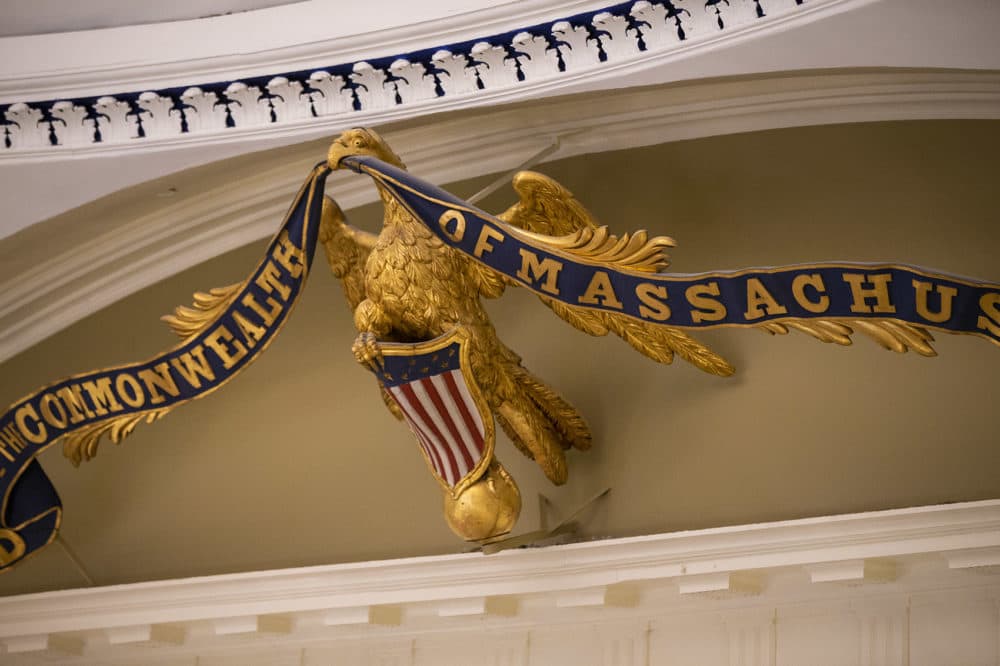Advertisement
Mass. Senate Set To Begin Debate On Police Reform Bill And Amendments
Resume
Lengthy debate is expected in Massachusetts Senate Thursday on a major policing and racial equity bill. More than 140 proposed amendments were filed to the bill by Tuesday's deadline.
The amendments are as wide-ranging as the legislation, which, among other things, would create the first certification process for law enforcement officers in the state and would limit officers' use of force.
Other amendments would provide stress management and mental health services to police officers and create what's known as a supervised consumption site, where people could use drugs under medical supervision.
One proposed amendment from state Sen. Jamie Eldridge would not allow any de-certified police officer to become a correction officer.
"As people are thinking about racial justice as well as improving police standards and protecting vulnerable populations, we [should] also think about our prisons and jails," Eldridge said.
Eldridge has also proposed that jails and prisons collect data on the use of force by correction officers, which came to the forefront in January amid violence at the Souza Baranowski Correctional Center, the state's maximum security prison.
As people are thinking about racial justice as well as improving police standards and protecting vulnerable populations, we [should] also think about our prisons and jails.
State Sen. Jamie Eldridge
Elizabeth Matos, executive director of Prisoners Legal Services of Massachusetts, said her office has received more than 200 complaints of assaults by correction officers just in the past year. More than 100 complaints are from men incarcerated at Souza Baranowski.
"There's been no independent investigation of that, no accountability mechanism for what happened and those clients are still calling us. That is still happening — even with COVID and the lockdown, we're still getting reports of assaults regularly," Matos said.
Matos wants the final bill on law enforcement reforms to apply to correction officers as well as police officers.
"We see just with what's happening out in the community with all of these videos, but this is happening in our jails and prisons as well. This isn't a different animal, it's the same animal in a different setting," Matos said.
Without amendments, the bill would create a Police Officer Standards and Accreditation Committee, which would certify police officers and have subpoena power for investigations. Citizens could submit law enforcement complaints directly to the committee, and complaint data would be available online.
The legislation would also ban officers use of chokeholds and curtail the use of tear gas. State Sen. Sonia Chang-Diaz, a member of the racial justice working group that crafted the bill, said the measure is in response to the nationwide protests over racial inequality and police violence.
"With this legislation, we can put in place structures that force institutions to reckon with discrimination, brutality and violence when they happen; to respond with vigor rather than silence and complicity, and to prevent some of the incidents from happening in the first place," Chang-Diaz said.
"I think sometimes this legislation can be a reaction to a national picture and not necessarily a Massachusetts issue.
Hampden Police chief Jeff Farnsworth
Many in law enforcement appear to support much of the legislation. Hampden Police Chief Jeff Farnsworth, president of the Massachusetts Chiefs of Police Association, said chiefs have been advocating for certifying and training officers for decades. But he said some parts of the bill are concerning — such as the ban on chokeholds.
"It's nothing we do or train or officers to do," Farnsworth said. "But we're reluctant to completely ban it because in a situation where deadly force would be authorized, where an officer would be fighting for his life, we don't want to take any tools off the table."
Farnsworth is also concerned about the bill's limits on what's known as qualified immunity, which can protect some officers from lawsuits over misconduct. Farnsworth said qualified immunity is rarely used and should be in place to prevent costly litigation.
Farnsworth said he hopes that there will be compromises as lawmakers work through the bill and amendments.
"I think sometimes this legislation can be a reaction to a national picture and not necessarily a Massachusetts issue. There's a perception that there's something going on here when there's really nothing factual to back that up," Farnsworth said.
The Massachusetts Sheriffs Association and the Legislature's Black and Latino caucus released a joint statement saying they support several provisions of the bill and are "dedicated to a collaborative approach to ensure injustices are not repeated."
The Senate is expected to vote on the bill Thursday. The House is expected to release its own version of a policing bill soon.
This segment aired on July 8, 2020.
